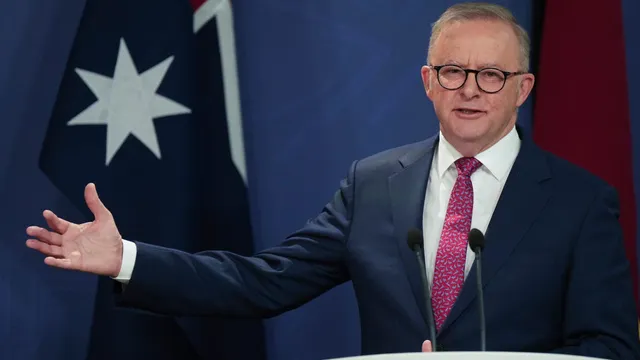
Australia demands answers from Russia about Australian POW
2025-01-15 11:47- Oscar Jenkins, an Australian taken prisoner while fighting for Ukraine, is reportedly harmed and possibly killed.
- Prime Minister Anthony Albanese demands Russia clarify Jenkins' situation and affirms the need for urgent action.
- Australia will consider expelling the Russian ambassador and imposing sanctions if harm to Jenkins is verified.
Express your sentiment!
Insights
Australia's Prime Minister Anthony Albanese has expressed deep concern over the potential harm to Australian citizen Oscar Jenkins, who was reported as a prisoner of war in Ukraine. Observations from social media reveal Jenkins being filmed in military attire, bound, and facing aggressive questioning by a Russian interrogator, raising alarms for Australian officials. Recently, allegations surfaced that Jenkins may have been killed while in captivity. As a response, Australian authorities have urged Russia for urgent clarification about his current status as they investigate the situation surrounding the treatment of their citizen. Australia's government has taken a strong stance, with Albanese stating that any confirmed harm to Jenkins would be met with decisive action. He emphasized the ethical responsibility of the Australian government to protect its citizens abroad and hold accountable those who violate international humanitarian principles. The Prime Minister mentioned that Australia’s Department of Foreign Affairs is actively seeking information from Russian officials and has called upon Russia to provide immediate confirmation regarding Jenkins’ wellbeing. Political scientists opine that if confirmed reports of harm emerge, Australia’s response could range from diplomatic actions to economic sanctions against Russia. The broader context reveals Australia’s past engagement in Ukraine. While Australian troops are not involved in combat, the nation's involvement includes military support through training missions and substantial financial aid to Ukraine's defense efforts against Russian aggression. Since the onset of the conflict in 2022, Australia has committed over AU$1.3 billion in military assistance, including recently announced tanks valued at AU$245 million. Jenkins, previously a teacher in Melbourne, joined the Ukrainian forces despite having no prior military experience, highlighting the significant personal risks individuals take in times of conflict. As the situation evolves, the government's insistence on addressing the possibility of Jenkins' mistreatment underscores a broader concern regarding the treatment of POWs in conflict zones. This evolving narrative could reshape Australia’s relationship with Russia, significantly influencing future diplomatic relations and military strategy as the world watches the outcomes of this incident unfold.
Contexts
The relations between Australia and Russia have undergone significant fluctuations over the years, informed by geopolitical events, international dynamics, and historical incidents surrounding Australian prisoners of war (POWs) during conflicts involving Russia. Understanding this relationship requires tracing back key historical moments, notably during World War II, when Australian soldiers were captured in the Pacific Theater and held by Japanese forces who had transitory alliances with the Soviet Union. Although not directly involved, the dynamics of Russian influence in the region and post-war engagements colored Australia’s perception of Russia for decades. This period set the stage for both collaboration and tension, particularly during the Cold War era, when both nations found themselves on opposite sides of a considerable ideological battle, impacting military and diplomatic dialogues. In recent years, the relationship has been further influenced by an array of global events including the Russia-Ukraine conflict, allegations of election interference, and various human rights concerns. Australia has consistently sided with Western allies in condemning Russia’s actions on the world stage, leading to strained diplomatic relations. The Australian government has also taken steps to prevent the spread of Russian influence within its borders, rallying support from allies within both the United Nations and regional forums. This collective stance against perceived aggression has underscored the complexity of the relationship, where historical grievances and contemporary political actions intertwine. The issue of Australian POWs in relation to Russian forces is particularly sensitive, as it revolves around the memories of bravery and sacrifice during times of global conflict. While the primary focus has historically been on the POW experience under Japanese forces, the specter of Soviet involvement in the Pacific war efforts lingers in the memory of veterans and their families. The narratives around these events stress the need for addressing historical truths and recognizing sacrifices made by those who served, contrasted against the backdrop of current tensions. Veterans' associations and historians advocate for greater acknowledgment of all facets of this historical narrative, including the role played by both Australian and Russian forces in their national conflicts. Moving forward, the path of Australia-Russia relations remains tenuous, shaped by ongoing developments in international law, human rights, and security. Both nations find it crucial to engage in open dialogue to foster understanding and mitigate historical tensions surrounding POW experiences. Future engagements should aim at reconciliatory strategies that respect the legacy of past conflicts while providing frameworks for collaboration amid current challenges. The potential for cooperation in non-traditional security areas, such as climate change or counter-terrorism, could pave the way for a more constructive relationship in the years to come, though trust-building will be essential in overcoming the deep-seated issues that mark the historical and present-day interactions between Australia and Russia.